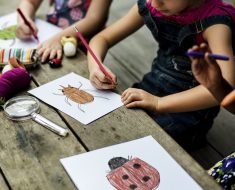Lying is a pretty smart and sophisticated protective strategy children adopt when faced with oppressive and so-called “disciplinary” practices.

‘Never lie,’ ‘Honesty is the best policy,’ ‘Jhoot bolna paap hai,’ — we have all grown up hearing these phrases. Therefore, it is not surprising that when asked, ‘What value would you want your children to have?’ we immediately reply, ‘Honesty.’ We want children who are completely honest and never, ever lie to us. Nothing troubles parents as much as a child who lies. After all, isn’t lying a sign of some inherent defect, a flaw that shows that they will grow up to be horrible human beings? What if I tell you that lying is necessary and not optional? And if your child is not lying at all, then you definitely need to be concerned. Let me unpack lying a bit and explain why kids need to lie every now and then.
It is a milestone
When children are very little, they look at lies in black and white, but as they grow older, they start understanding the shades of grey and the nuances of it. According to extensive research carried out by psychologist Dr Victoria Talwar in McGill University, four-year-olds will lie once every two hours. In contrast, six-year-olds will lie once every hour. It could be about most inconsequential things like lying about washing their hands before dinner to not touching the chocolate in the fridge.
It shows the child has imagination and advanced cognitive skills
Lying requires what psychologists call ‘theory of mind’ — a nuanced understanding that what is going on in her mind is different from what’s going on in someone else’s mind. Once the child discovers this, then she is like a little scientist, telling little lies (‘I drank my milk’) and enjoying the sense of autonomy it gives her. It also fires children’s world of fantasy and imagination. As Po Bronson author of Nurture Shock puts it “A child who is going to lie must recognise the truth, intellectually conceive of an alternate reality, and be able to convincingly sell that new reality to someone else.”
It helps in social interaction
Can you imagine the horror if our little ones started becoming painfully honest in all social situations? ‘I don’t like you because you stink,’ ‘Mummy thinks that dinners in your house are very boring!’ They need to pepper their way with little lies to ease themselves in new social territories like schools, friends’ homes and park. No wonder lying is seen as a huge milestone for celebration when a child with Autism starts lying as it shows that he is developing a theory of mind, sense of separate agentic self from others, who has his own wishes, desires and hopes.
It is a life skill
A dash of dishonesty isn’t optional, it’s necessary. In the initial years, children might lie just explore and flex their fascinating imagination, or they might lie to avoid punishment, but as they grow older, the reasons become much more complicated. It could range from lying as a way of being considerate and empathetic (‘You did not get the prize but your drawing was the best’), keeping secrets, forging bonds of friendship (‘We will tell Ma’am that both of us are not feeling well’), or even as a way of increasing a sense of power and control (‘My father is the strongest man on this earth’).
Protective strategy
In my experience I have noticed that in our society children lie about their studies – about their marks, homework etc. Keeping in mind the amount of pressure we put on them, I would consider lying a pretty smart and sophisticated protective strategy they adopt when faced with oppressive and so-called “disciplinary” practices. And that could go for many other areas where they are subjugated — punitive restrictions on girls, control of what they wear, who they choose as friends, how they behave in public.
It can be survival skill for kids who have gone through trauma
Children often start lying as a way of coping with turbulent situations. In our work with street children, we have found that they end up lying a lot. It is very easy from our privileged position to judge them as being ethically corrupt but we need to understand that a child on the streets is most vulnerable and his reality is constantly shifting as he hangs on to basic threads of survival. He will lie about his name, age, family, anything so that he can get some money for him to survive that day. Similarly, children who grow up in abusive homes might often lie as they learned very early on that lying was the only thing that would keep themselves safe.
Now I am not giving a complete cart blanche on lying. If the lying becomes persistent, then we might need to get to the bottom of it. In my work with families, when parents complain about a child lying to them, rather than getting alarmed and seeing it as a problem, I am more curious to know if it is becoming a pattern and what is pushing the child to do so. The child is not the problem, the problem is the problem.
Taking a moral or righteous stand will not work. Our relationship with our children is like a bank account; we are constantly making deposits (love, caring, fun times) in it and also withdrawing (shouting, scolding, criticising) from it. Many times, due to life circumstances when our deposits are less than the withdrawals, it leads to a relationship bankruptcy and children might push back through their self-protective actions of being secretive, lying or becoming rebellious. So next time your child lies to you, just reflect on your emotional bank account and start working on making healthy deposits rather than being harsh on him.
Suppose you messed up at work and you knew that if you did share it with the boss, he would react by ridiculing, shaming and putting more sanctions on you. What are the chances that you would own up to your mistake every time and not lie to protect yourself? The same goes for children. They need to get the message that you value honesty and if they do share something with you, then treat them with respect and not react harshly.
Finally, let’s be honest about the fact that we all lie. It is hypocrisy to tell the kids not to lie when they see you lying about the smallest things like your age or calling in sick at work. I always find an open discussion with kids on white or convenient lies and nonnegotiable honesty very crucial.
In the words of the famous and notorious Dr House, ‘Everybody lies.’ So, children will lie too, they will fib, they will weave stories. But, hopefully, with time as they grow and learn, honesty will not just remain an empty word but become a value that can help them build muscles of authenticity, trustworthiness as they navigate their way through life.
For all the latest Parenting News, download Indian Express App
Source: Read Full Article








